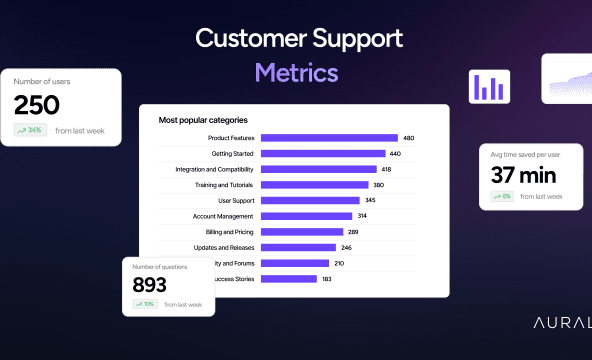Customer support metrics
Customer support metrics are key performance indicators (KPIs) used to evaluate the efficiency, effectiveness, and overall performance of customer support teams and systems. These metrics help businesses understand how well they are meeting customer expectations, where improvements are needed, and whether their support processes are working efficiently. By tracking and analyzing these metrics, businesses can continuously enhance their support services, boost customer satisfaction, and ensure they provide a positive customer experience.
One of the most common customer support metrics is First Response Time (FRT), which measures the time it takes for a customer to receive a reply after submitting an inquiry. A quick first response is crucial for customer satisfaction, as long response times can lead to frustration and dissatisfaction. Businesses should aim to reduce this metric to provide timely service and keep customers engaged.
Resolution Time is another important metric that tracks the time it takes to fully resolve a customer’s issue. The faster the resolution time, the more efficient the support process is, and the higher the customer satisfaction. This metric also helps identify whether support teams are equipped to handle complex issues efficiently or if additional resources are needed.
Customer Satisfaction (CSAT) scores provide direct feedback from customers about their experience with support. Typically measured via post-interaction surveys, CSAT scores reflect how satisfied customers were with the service they received. A high CSAT score indicates that the support team is meeting or exceeding customer expectations, while low scores can pinpoint areas for improvement.
Net Promoter Score (NPS) measures customer loyalty by asking how likely customers are to recommend a company to others. This metric is often used to gauge the overall perception of the company and its customer support. A high NPS score suggests that customers are happy with the service and are likely to return or recommend the business to others, while a low score may indicate issues that need to be addressed.
Another valuable metric is First Contact Resolution (FCR), which tracks the percentage of customer inquiries that are resolved on the first interaction without needing follow-ups. A high FCR rate is an indicator of effective problem-solving, as it shows that customers are receiving the answers or solutions they need without additional communication. Improving FCR helps reduce operational costs and increases customer satisfaction.
Ticket Volume refers to the total number of customer support requests, which can help businesses gauge the overall demand for support services. Tracking ticket volume helps businesses anticipate busy periods, allocate resources effectively, and identify recurring issues that could require process improvements or product changes.
Customer Effort Score (CES) measures how easy or difficult it is for customers to resolve their issues with support. The lower the effort required by the customer, the better their experience. A low CES indicates that customers find it easy to get help, while a high CES signals that the support process may be confusing, cumbersome, or inefficient.
Finally, Agent Utilization Rate tracks how efficiently support agents are handling inquiries. It measures the ratio of time agents spend actively resolving customer issues versus idle time. High agent utilization indicates that support teams are busy and productive, but it’s essential to maintain a balance to avoid burnout and ensure high-quality service.
By consistently measuring and analyzing these customer support metrics, businesses can continuously improve their service operations, enhance customer satisfaction, and provide a seamless, effective support experience that fosters loyalty and trust.

- Articles
-
 Amy
Amy
- 10 min read
